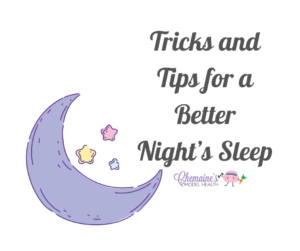Tricks and tips for a better nights sleep!
Category : Uncategorized
Tricks and Tips for a Better Night’s Sleep;
-
Calming teas such as Reishi, Tulsi, Valerian, Passionflower, Chamomile and Skullcap.
-
Magnesium which is a relaxant and helps relieve tension throughout the muscles and nervous system. Magnesium citrate can act as a mild sedative that helps the body to fall asleep. It also increases deep sleep and decreases nighttime cortisol. I like to start at 300-400 mg before bed.
-
GABA which is an anxiety blocker. Most people who have insomnia or wake during the night are suffering from anxiety. The adrenaline and cortisol dump during the night wakes them and then they struggle to fall back asleep. GABA is beneficial for many people dealing with this and Adrenaline Dominance.
-
Collagen in the evening can be very beneficial due to its glycine and ability to push you into deep sleep. Glycine also helps with blood sugars, inflammation and dropping the body’s core temperature – all essential for optimizing recovery!
- Ashwagandha taken from 6pm onwards can help shut down cortisol and improve melatonin and sleep quality. This is generally in supplement form.
-
Topical progesterone 5%. There is research and a lot of supporting work by Dr Michael E Platt on the effectiveness of topical progesterone from pushing down adrenaline, cortisol and inflammation, and thus supporting good sleep.
-
CBDa can be very helpful at relaxing the body and supporting sleep quality.
-
Melatonin in doses from 3-10mg can be helpful for some people, but if you find yourself groggy the next day or feeling “off” you may need a lower dose, split doses, or your body doesn’t actually need melatonin – its making enough of its own.
-
Tryptophan is a precursor to Serotonin and Melatonin. You can boost Tryptophan in the evening by consuming; turkey, chicken, eggs, pumpkin seeds, sesame seeds, avocado and white fish. Calcium and vitamin B6 help with absorption. You can also get a supplement of L-Tryptophan taken twice daily, once with carbs, and the second before bed. You can help convert Tryptophan to 5-HTP by pairing it with vitamin C and folate.
-
Taurine has been shown to push down stress and anxiety, and increases the body’s natural GABA production. Doses range from 500-1500mg before bed.
- Theanine or L-theanine increases alpha waves (found in REM sleep).
- Vitamin B6 before sleep can help with REM sleep and remembering dreams. We would be looking at 240mg here.
- Zinc and vitamin C may support sleep. Zinc boosts testosterone and vitamin C can help with progesterone. Sufficient levels of both are calming and help with sleep quality.
To be used as a last resort…
One could stack 5 HTP with melatonin and hour before going to bed. The effect can be improved with B6 and Zinc. ZMA or zinc+magnesium+B6 can also be effective.
Its important to also note;
Getting direct sunlight early in the day (or blue light spectrum), especially after waking is an important player in the circadian rhythms, hormones and sleep. Blood sugars can greatly influence sleep, you should work on balancing them. Some studies also show that grounding can help with sleep and insomnia. Reference.
Exercise has also been shown to greatly improve sleep quality, deep and Rem. Reference.
Avoid substance that can effect sleep negatively like;
- Caffeine
- Theobromine and theophylline (cacao and kola nut)
- Alcohol
- Excess sugar
- Tyramine containing foods (bacon, cheese, eggplant, potato, tomato, spinach, sausage).
I hope you found this helpful and please reach out if you have any questions! And will maybe try these before resorting to medications. Good luck on your sleep quest! xo


